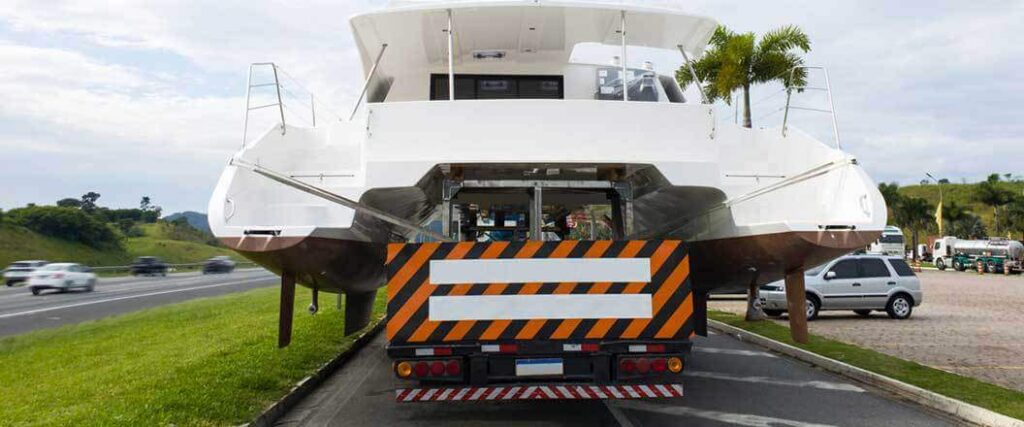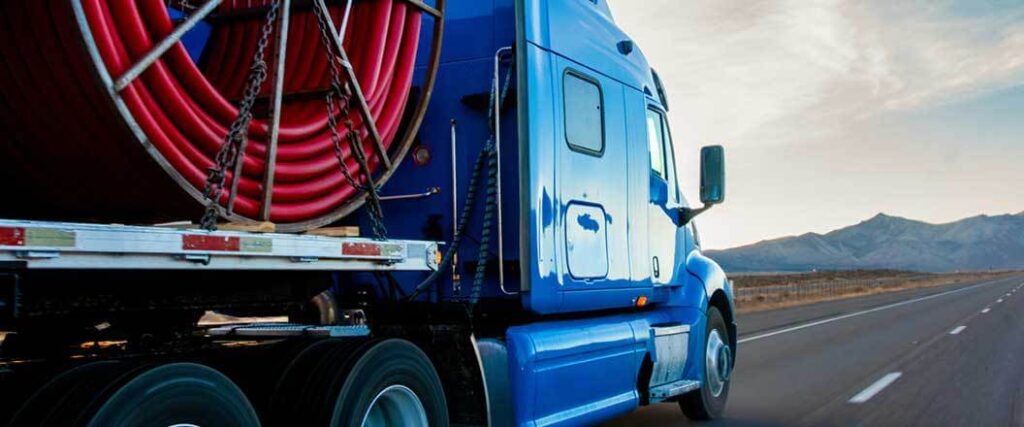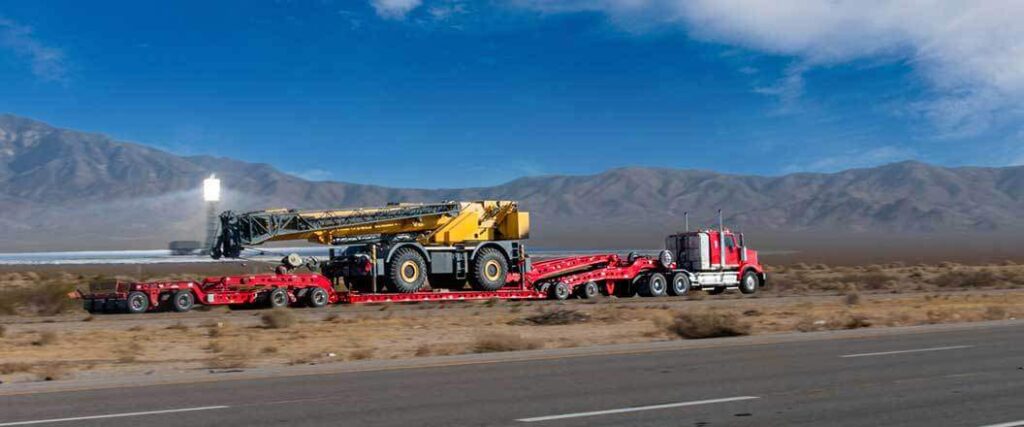Heavy haul freight brokers work with some of the most experienced drivers and carriers in the shipping industry. It’s not just any company that can cross all kinds of terrain with loads that can weigh over 100,000 pounds. Heavy loads also come with heavy price tags that you don’t want to trust with just anyone who claims to be a freight broker.
Heavy haul freight brokers specialize in organizing the transportation of cargo that exceeds standard Department of Transportation (DOT) regulations. These brokers are knowledgeable about labeling requirements, the use of escort vehicles, and unique state regulations. This knowledge is needed to avoid strict DOT penalties.
Learn what heavy haul freight brokers can do for you and why everyone needing heavy haul services should be using one.

When you have a new excavator that cost $400,000 and a few hundred miles of icy roadway between it and the destination, transportation matters. It's not just any driver or any truck that can safely move such a load.
It’s also not every broker that knows the right people and equipment needed for a heavy haul or oversize load shipment. Load regulations vary from state to state and require someone with a very specific knowledge set.
Details heavy haul brokers can help with include:
Whether you need to move wind turbines or military vehicles, a trusted heavy haul broker can assist you with your freight management needs.
On paper, a heavy haul broker does the same thing as any freight broker. They can arrange shipping and delivery details, hire trucks, vet drivers, and more. The difference is the amount of experience and level of expertise a heavy haul broker will bring to the table.
A heavy haul broker is licensed by the Federal Motor Carrier Safety Administration (FMCSA) and specializes in arranging transport for goods and materials that exceed standard DOT freight limits.
To get a license, most freight brokers attend some kind of formal training or freight broker school. Others rely on industry experience to get their license. Most training programs take just over one month.
Common subjects covered in training include:
Many of these skills are taught on a basic level to help brokers get started in the business. The presence of a license, therefore, isn’t proof of experience or quality by itself.
Most professional brokers in the heavy haul transport industry have been active for years. It’s also possible for an owner/operator of a truck to get their own license to arrange freight for themselves and perhaps a small team.

Freight comes in all shapes and sizes. To ship such a large variety, there is a wide selection of trucks and trailers. With variety comes different levels of difficulty, and oversized and out-of-gauge freight are considered some of the most challenging.
The need for specialized equipment, training, and permitting limits the pool of available drivers and carriers to choose from. Within the field of heavy haul trucking, there are further specialties requiring even more training.
It’s important to work with heavy haul brokers because they can make sure the driver has the right training and equipment to handle the load.
To that end, let’s look at both driver requirements and trailer requirements that brokers look for in heavy haul.
All vehicles that are moving freight for a transport company are considered Commercial Motor Vehicles (CMVs). As a CMV, drivers must have a Commercial Driver’s License (CDL) and the vehicle itself needs to have a registered DOT number clearly displayed.
A CDL is a minimum requirement for heavy haul or any other commercial transport service position.
A CMV can be any vehicle commonly used in shipping services, such as:
CMV classification is based on use rather than type. Having a CDL does not automatically qualify someone for heavy haul since they may simply be using it to drive a van or pickup.
Heavy haul brokers are aware of this, so they look for drivers with specific types of CDL licenses and endorsements. These vary based on Gross Vehicle Weight Rating (GVWR) and transport purposes.
There are three levels of CDL licenses and each state issues its own.

Our expert brokers specialize in route planning and state regulations. Get a personalized quote from our industry experts.
In addition to the actual license, the driver can also receive additional training to qualify for endorsements. These are obtained by drivers and not carrier companies, a distinction that freight brokers need to consider.
Common endorsements that drivers pulling oversized loads attain include:
These represent a sample of endorsements that can go on licenses. Drivers can still seek out additional training that covers heavy haul specifically. There are programs that focus on training drivers to haul car carriers, wind turbines, and various forms of Hazmat.
The more specialized the haul, the harder it is to find qualified drivers. There are stiff penalties imposed on drivers and carriers caught with loads they aren’t qualified to pull. As a shipper, you shouldn’t trust your load to someone who isn’t qualified or experienced enough.
Having experience and training is excellent, but even the best driver is limited by the quality of the available equipment. An owner/operator is in charge of their own equipment, but those who work with a carrier have to rely on the trucks and trailers they are provided with.
The DOT inspects all CMVs and trailers at least once a year. This is a legal requirement for a vehicle to keep its DOT registration active. A responsible carrier will make sure that truck drivers are routinely performing their own inspections, often following DOT inspection lists.
The heavier and more complex the trailer, the more important routine inspections are. This is especially important when an oversize load requires specialty axel configurations or extendable flatbed trailers.
Heavy haul trailers and equipment include:
Most of these trailers weigh upwards of 14,000 pounds unloaded. The longer the trailer, the more axles it will have, and the heavier it will be.
Heavy haul load brokers become familiar with major and minor carriers during their careers and know which ones are being proactive about trailer and equipment maintenance. The DOT does not actually specify how often maintenance work on trailers needs to be done.
If you don’t have experience with freight shipping companies, it’s difficult to know which ones are doing the bare minimum to pass inspections, and which ones are dedicated to routine maintenance.

Once you’ve realized that you need a heavy haul load broker, the next step is actually finding one. Before you select the first broker that appears in your search engine or the one that gives you the cheapest quote, you need to do some quality control.
Your heavy haul broker should ask you about the following details:

Reach out to us at (855) 490-2433 or fill out our quick form and a live agent will be in touch shortly to make sure your loads follow all DOT regulations.
Sharing these details with your freight broker means they are better able to find a suitable heavy haul carrier and driver. Whether you contract with an independent broker or one who works for a larger carrier, you want an honest response to these needs.
If you need to move construction equipment worth several hundred thousand dollars, it's more important to choose highly rated and qualified people. The services will likely cost more, but you’re also going to get peace of mind.
Heavy equipment hauling services don’t come cheap - but then again, neither is your cargo. Going the extra mile to hire a freight broker shows that you care about the shipping process and the condition of your freight upon arrival.
From piping and plane parts to boilers and boats, shipping oversized equipment is never boring. To do it right, hire the right resources and look into a heavy haul freight broker.
At Heavy Haul and Oversize, we make sure your oversized freight is traveling with the best drivers in the business and following all DOT regulations in every state it passes through.
Our brokerage services can look into a variety of unique shipping requirements including:
Don’t trust your heavy equipment shipping needs to just anyone. At Heavy Haul and Oversize, you can rest easy knowing that we are putting decades' worth of shipping knowledge into every single arrangement we make.
Give us a call today at (855) 490-2433 to speak directly with a representative. Already have your shipping details? Get a quote now and make shipping arrangements to suit your needs.
Heavy Haul and Oversized
315 NE 14th Street #4122
Ocala, FL 34470
Good Morning!
I am reaching out to let you know that we have pilot trucks that service Western Canada. We primarily escort loads from the BC Border to Kamloops and the lower main land, although we also have some regular runs out of Alberta. We pride ourselves on safety, integrity and will work with you on rates!
Let me know if you would like to chat further!
Dennis Beneke
Rigger Up Contracting Inc.
780-728-5811